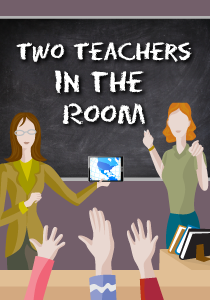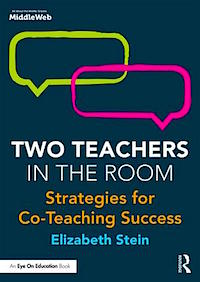Begin Now to Rejuvenate Your 2019 Co-Teaching
A MiddleWeb Blog

As a new year unfolds, I find great value in zooming in on a year-round reflective process as a way to keep our co-teaching on an effective trajectory. And January is a great time to pause and reflect. So, let’s do this!
How healthy is your co-teaching partnership?
At this point in the year a range of co-teaching experiences have emerged. Experiences range from strong collaborative partnerships to limited, and possibly dysfunctional, partnerships. And every scenario you can imagine in between.
Take a second (or less!) to think about where you fit along the range. This new year provides any co-teacher the opportunity to use the skill of reflection to illuminate a powerful co-teaching experience for the remainder of this school year.
Are you hoping to sustain the strong partnership you have been cultivating since September? Or has your co-teaching relationship already reached the point where you are counting the hours until the last day of school?
All it takes is a few minutes to validate your co-teaching connection, or to turn your co-teaching experience on its head! Here’s all you have to do: take a few minutes to individually reflect on the following —
- Identify one thing that is going well so far this year.
- Jot down one thing that is not going well.
- What have you done, so far, to redirect what is not going well?
- What resources can you tap into to guide you toward positive actions?
- How can you use what is going well to guide you to improve on a selected area of concern?
The semester through one teacher’s eyes
Tapping into my collaborations with teachers across the nation, I invited a few co-teachers to take this exact new year’s reflective challenge. Below is one example that could nudge you into going deeper into reflecting on your own experiences to date. For purposes of confidentiality, of course, “Joan” is a pseudonym for a very dedicated, tireless, talented, and quite frustrated co-teacher somewhere in the United States.
I gave Joan the list of reflective questions above and asked her to candidly share her thoughts in stream of consciousness mode. She gave me permission to share some of her reflections here. I’ve paraphrased her abridged reflective narrative:
One thing going well is that my inquisitive nature prevails. I am always reading, researching, and applying what I read about what works to guide students to connect with the learning process.

The students are frustrated – and we end up just going through the teaching motions to keep up with the curriculum map and timeline. We offer extra help and provide online supports through our website to try to redirect and support students’ learning but we need more.
I think the greatest resource I could continue to tap into is my own genuine desire to make this work. My co-teacher and I do not have the time to plan together – and during class the focus is all about providing the content they need to know. Looking at these reflection questions really opens my eyes because I see that the one thing that is going well – namely my unstoppable quest to identify effective instructional strategies – could be a powerful way to address and improve my area of concern.
Now…if I could only find the time to get on the same page with my co-teacher – we could really do wonders here!
Action steps for Joan…And you?
Now for the most empowering part! Once you’ve surfaced your narrative, ask yourself, “Now what?!” What are you going to DO about it? In my further conversations with co-teacher “Joan” we identified specific action steps that she could take to redirect and align what is going well with what she is determined to improve. Here are some solutions:
- Use Google Drive & Tools and text messaging to maintain a co-planning connection and assure consistent communication.
- Incorporate more student-centered methods to provide space for students’ processing and understanding. If you are looking for ideas about that, check out these 60 student-centered strategies to get started!
- Incorporate more formative assessment to amp up students’ awareness if their performance – as well as inform the co-teacher team as they consider their next instructional moves.
- Ask the students! As you look for solutions, have conversations with your kids to find out what works for them – there is so much we can learn about effective teaching by just asking the students to be a part of the problem solving and decision making process.
- Invite the principal into the classroom to encourage deeper thinking about the possible range of supports.
Are you feeling it yet? This powerful reflective process could be just the thing to rejuvenate your co-teaching experiences for the remainder of the school year. Just keep the reflection questions handy…grab a pen and piece of paper, release your narrative stream, then be ready for action!
Consider taking an additional step: ask your co-teacher to share in the reflection process! And I invite you to jot the gist of your reflective experience here in the comments section. All of our experiences are so connected. Let’s start a solution seeking conversation now!
What do you say? Are you ready to take the 2019 co-teaching reflective leap?
_______________________________________________
































